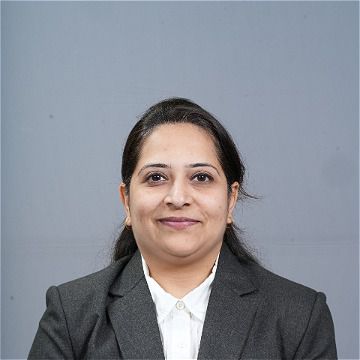Faculty Members

Prof. Urja Mankad
Assistant Professor
PhD (Persuring), MCA
Date of Joining LJICA 10th Aug, 2010.
Area of Interest
Networking and Database Management
Majors Degrees
2004 Master of Computer Applications, Sardar Patel University, Gujarat, India.
2001 Bachelor of science in Electronics, Sardar Patel University, Gujarat, India.
Online Certified Courses
Python
-
2004 - 2010 Software Developer in Reputed Company.
-
2010 - Present ASSISTANT PROFESSOR, L. J. Institute of Computer Applications, Gujarat University, Gujarat, India.
Journal/Conference Publication
-
2020 Urja Mankad, "A Study of the open source framework OSGP / GXF for implementing Smart Water Metering" in Fourth World Conference on Smart Trends in Systems, Security and Sustainability (WorldS4), London, United Kingdom, 2020,pp. 357-361, DOI: 10.1109/WorldS450073.2020.9210291.
-
2018 Urja Mankad, "Survey of IoT Frameworks for Smart Water Metering" in National Conference on Advanced Research Trends in Information and Computing Technologies(NCARTICT-2018), Indian association with International Journal of Scientific Research in Science, Engineering and Technology, IJSRSET | Volume 4 | Issue 1 | Print ISSN: 2395-1990 | Online ISSN : 2394-4099.
-
2018 Urja Mankad, "RFID based Security in Internet of Things: A Study" in Christain, Thomson et al. “RFID based Security in Internet of Things: A Study.” International journal of scientific research in science, engineering and technology 4 (2018): 87-92.
Subjects taught : Undergraduates
Basic mathematics (1st sem),
Fundamentals of web(1st sem.),
Software Project - I (1st sem.),
User defined project-II (2nd Sem.) ,
Data Structures (3rd sem.) ,
UML and Object- Oriented Language(4th sem),
Python (4th sem),
Fundamental of Computer Applications(1st sem),
WDT (3rd sem),
SE (5th sem)
Subjects taught: Postgraduates
Data Science Project(9th sem),
Data Structures(L-3rd sem),
SEO(5th sem),
AN(5th sem),
User Define Project (10th sem and 6th sem),
Operations research (4th sem)
Syllabus as per GTU MCA/IMCA
Research Work:
Research study includes mining of web structure. Web structure mining has main two components such as arcs and nodes. Arcs means link between two web pages and node means web page itself. It is a tedious task to find relevant and authoritative webpage from vast web. Web structure mining plays important role in finding authoritative and relevant web pages. There are two basic algorithms, works on web structure mining such as PageRank and HITS which provides efficient search results. PageRank algorithm used by one of famous search engine, Google. HITS provides two types of rank score Hub and Authority score. The aim of research study is to find an efficient web page rank algorithm using web structure mining. I have divided research study in following four phases such as literature review, identify loophole, proposed algorithm to reduce the effect of the problem found and result and analysis. This way I have decide my research scope. However, I have collected the research papers which are related to web structure mining. After collecting numerous research papers, I have analysed the research paper and distinguished paper which are purely based on web structure. During the observation I have found the mutual reinforcement problem. I have decided to work on mutual reinforcement problem. Mutual reinforcement means creating a link between web pages from the same domain and to the same domain, just to improve the rank of web pages. I have collected data from cs.torrento.edu website and cleaned it according to the requirements. To reduce the mutual reinforcement effect author has proposed three different parameters such number of inlink from different domain, number of outlink from different domain and reachability. I have also checked correlation of proposed parameters with the relevancy of web pages. It has been observed that there is a positive correlation between proposed parameters and relevancy of the web page. In proposed algorithm (IPRA) I have used all the proposed parameters. I have reduced the links between web pages with the help of reachability value. In research study I have proposed the algorithm (IPRA) through which mutual reinforcement effect will be reduced. The fourth phase is result and analysis in that I have analysed the proposed algorithm with the two analysis techniques. First is independent variable t-test. By using python scripts, I have generated data for the analysis and check the significance of result at 95%. To check how much mutual reinforcement effect will be reduced through the proposed algorithm(IPRA), I have used precision and recall test. I have generated the data using python scripts for the calculation of precision, recall and accuracy. In this research study I have also used different graphs to represent the result set. I have used different tool to represent chart such as Ms-Excel, Tableau, R programming and Python
2019 Conducted a one day workshop on Web design technology(PHP) at LJICA, Ahmedabad
2019 Participated in FDP on Cloud based web application development using python (Django + MongoDB) at LJICA, Ahmedabad.
2019 Participated in 5days conference: 7th International Conference on Big Data Analytics at Ahmedabad University.
2019 Attended one day FDP on Data Science and Code optimization at GTU, Ahmedabad.
2014 Participated in the How to write workshop at GTU, Ahmedabad
2013 Attended the workshop on Research Methodology at LJMCA campus
Contact
LJ Institute of Computer Applications,
LJ Campus, Near Sarkhej-Sanand Circle,
Off. S.G. Road, Ahmedabad-382210
Phone: 9099063417
Email: urja.mankad@ljinstitutes.edu.in
